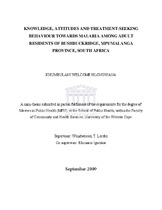Knowledge, attitudes and treatment-seeking behaviour towards Malaria among adult residents of Bushbuckridge, Mpumalanga province, South Africa
Abstract
Introduction:Highest-risk malaria areas in South Africa share borders with Mozambique, Swaziland and Zimbabwe. Ongoing migration between these neighbouring areas impacts on malaria control interventions. For example, 30% of the adult population in Bushbuckridge originate from Mozambique. Despite these dynamics, no studies were found which investigated knowledge,attitudes and behaviours towards malaria in Bushbuckridge.
Methods:This study was undertaken as a descriptive cross-sectional survey. A field-piloted structured questionnaire was administered to 602 randomly selected households, where only one household member was interviewed. Interviewees were heads of households, but in their absence,
responsible adults above 18 years were included.Results:Of 602 respondents, 93% (n=559, 95% CI: 90.4 – 94.7%) had heard about malaria, mainly from health facilities (29%, n=175) and radios (20%,n=119). Most respondents correctly associated malaria with mosquito bites. There were no differences in knowledge of the causes of malaria between males and females, whereas age and educational level influenced malaria knowledge.Younger and more educated respondents were more knowledgeable than their older and less educated counterparts. Despite 91% of respondents (n=546, 95% CI: 88.0 – 92.8%) knowing that malaria can kill if untreated; only 48% could identify one or two symptoms of malaria. Most (99%, n=595, 95% CI: 97.5 – 99.5%) of the respondents would seek treatment at health facilities,82% (n=488) of whom would do so within 24 hours of onset of malaria symptoms.Discussion and conclusion :
Most respondents showed a fair amount of knowledge on the causes of malaria, but not enough people were able to correctly identify the key symptoms of malaria. Health facility and radio were the main sources of malaria information. Most respondents sought treatment at health care
facilities, contrary to most African countries where treatment is first sought at non-public health facilities.Word count: 288

